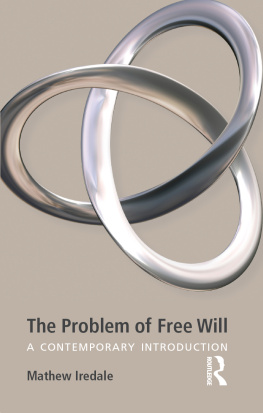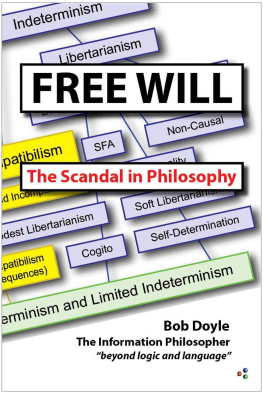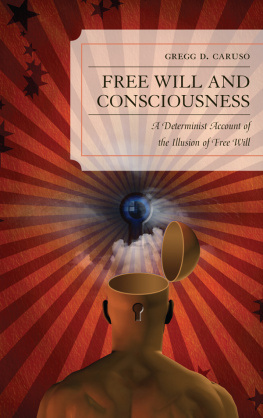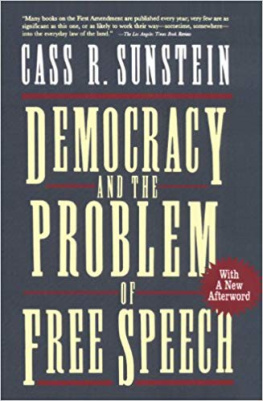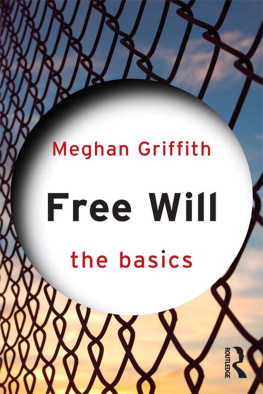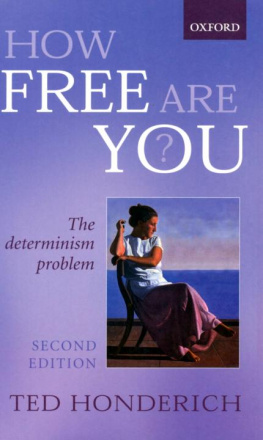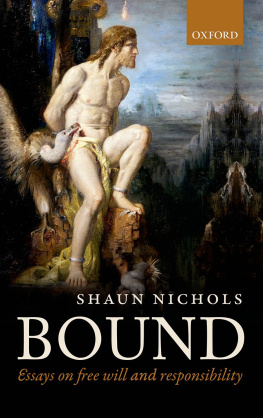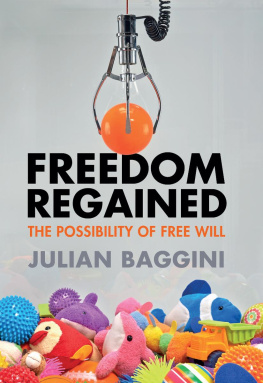
The Problem of Free Will
The Problem of Free Will
A Contemporary Introduction
Mathew Iredale

To my mother and father
First published 2012 by Acumen
Published 2014 by Routledge
2 Park Square, Milton Park, Abingdon, Oxon OX14 4RN
711 Third Avenue, New York, NY 10017, USA
Routledge is an imprint of the Taylor & Francis Group, an informa business
Mathew Iredale 2012
This book is copyright under the Berne Convention.
No reproduction without permission.
All rights reserved. No part of this book may be reprinted or reproduced or utilised in any form or by any electronic, mechanical, or other means, now known or hereafter invented, including photocopying and recording, or in any information storage or retrieval system, without permission in writing from the publishers.
Notices
Practitioners and researchers must always rely on their own experience and knowledge in evaluating and using any information, methods, compounds, or experiments described herein. In using such information or methods they should be mindful of their own safety and the safety of others, including parties for whom they have a professional responsibility.
To the fullest extent of the law, neither the Publisher nor the authors, contributors, or editors, assume any liability for any injury and/or damage to persons or property as a matter of products liability, negligence or otherwise, or from any use or operation of any methods, products, instructions, or ideas contained in the material herein.
ISBN: 978-1-84465-503-8 (hardcover)
ISBN: 978-1-84465-504-5 (paperback)
British Library Cataloguing-in-Publication Data
A catalogue record for this book is available from the British Library.
Designed and typeset in Minion Pro.
Contents
I have been reading, writing and thinking about free will for some twenty years now, not a long time by the standards of some, but long enough to have been influenced by more people than I can possibly remember. Having said that, there are several people who deserve a special mention in the development of this book.
First and foremost, Nicholas Maxwell, who made me realize the importance of science, and not determinism, to the problem of free will, and also to see that the problem of free will is just one part of a much larger philosophical issue.
I also wish to thank Julian Baggini, Jeremy Stangroom and the anonymous reader from Acumen for their comments on earlier drafts of this book. Their honest and insightful criticism has allowed me to make significant improvements to both the style and the content of the book, and for that I am very grateful.
The spacetime diagrams in were adapted from the wonderful animations used by Professor Andrew Hamilton of the University of Colorado on his excellent special relativity website, and I am grateful for his permission to use them as the basis for my diagrams.
I also wish to thank Professor Robin Dunbar and Chris Draper for their comments on an earlier draft of .
On a separate note, I should point out that when discussing John Thorps libertarianism in , for the sake of clarity I have replaced his phrase agent causality with the now more common phrase agent causation.
Finally, I wish to thank my ever-loving wife, Clara, for having to deal with my growing obsession (as she saw it) with free will. All I can say in my defence is that I could not help it as I was clearly at the mercy of my heredity and the environment. Or was I ? Either way, I promise not to mention it again. Its the mindbody problem from now on!
All theory is against the freedom of the will; all experience for it.
Dr Samuel Johnson
What is it about free will that makes it such a difficult problem? One obvious answer is its complexity. Although philosophers refer to the problem of free will, it is in fact made up of a number of interrelated problems: Do we have free will? Why do we think that we have free will? What affects or limits our free will? Do such affecting or limiting factors apply equally to everyone? How is free will related to moral responsibility? Is free will compatible with determinism (the thesis that there is only one physically possible future or only one physically possible outcome following a series of events)? This last question raises what is for many philosophers the core problem of free will. Over the centuries the determining agent has varied (fate, God, the laws of nature or logic, our heredity and environment, and social conditioning, to name the most obvious contenders), but the overall fear has remained the same: are we determined to make the decisions that we make, and if we are, in what meaningful or valuable sense, if any, are our decisions free?
Since at least the seventeenth century, the free will debate has been dominated by three main groups, defined by their attitude to determinism. Those who believe that free will is incompatible with determinism are known, with admirable clarity, as incompatibilists. They can be divided into two opposing groups. Those incompatibilists who reject determinism because they believe that we have free will are known as libertarians. Those incompatibilists who deny that we have free will because they believe that we are determined are known as hard determinists. The other main group, those who believe that free will is compatible with determinism, are known as compatibilists. In contrast to hard determinists, compatibilists used to be called soft determinists, but as few compatibilists now defend the view that we live in a deterministic universe (they only argue that if we did, we could still be free), this term has become almost redundant. In a similar fashion, some of those who would have traditionally been called hard determinists now go by the term hard incompatibilist. They are agnostic about whether we actually live in a deterministic or indeterministic universe but argue that free will is incompatible with either possibility.
Although determinism still dominates many of the current debates about free will, it is important to realize that for some philosophers determinism is just a side issue. Nicholas Maxwell, for example, argues that the traditional formulation of the problem Is free will compatible with determinism? should be replaced by Is free will compatible with what modern science tells us about the universe? (Maxwell 2005; Iredale 2009). Galen Strawson argues that the central issue of the free will problem is the logical impossibility of absolute or ultimate responsibility (G. Strawson 1986), while for Richard Double it is that free will is not a logically coherent concept (Double 1991b). To such philosophers, determinism is at best an irrelevance, a distraction from the real issues to be tackled, and at worst the cause of years and years of misguided and wasted time and effort.
Compatibilism, libertarianism and hard determinism were once thought to exhaust the possibilities as far as responses to the free will problem are concerned. That they do not is clear from the work of Strawson and Double, and also from an increasing number of others who have proposed alternative solutions to the problem. One of these is John Martin Fischer, who defends what he calls the metacompatibilist view that we do not have free will as traditionally conceived, but that we can still be held morally responsible for our actions (Fischer 2007). Other alternatives to the traditional solutions include Manuel Vargass revisionism (Vargas 2007) and Bruce Wallers natural autonomy (Waller 1998). In contrast to Fischer, they each accept that we have a
Next page
